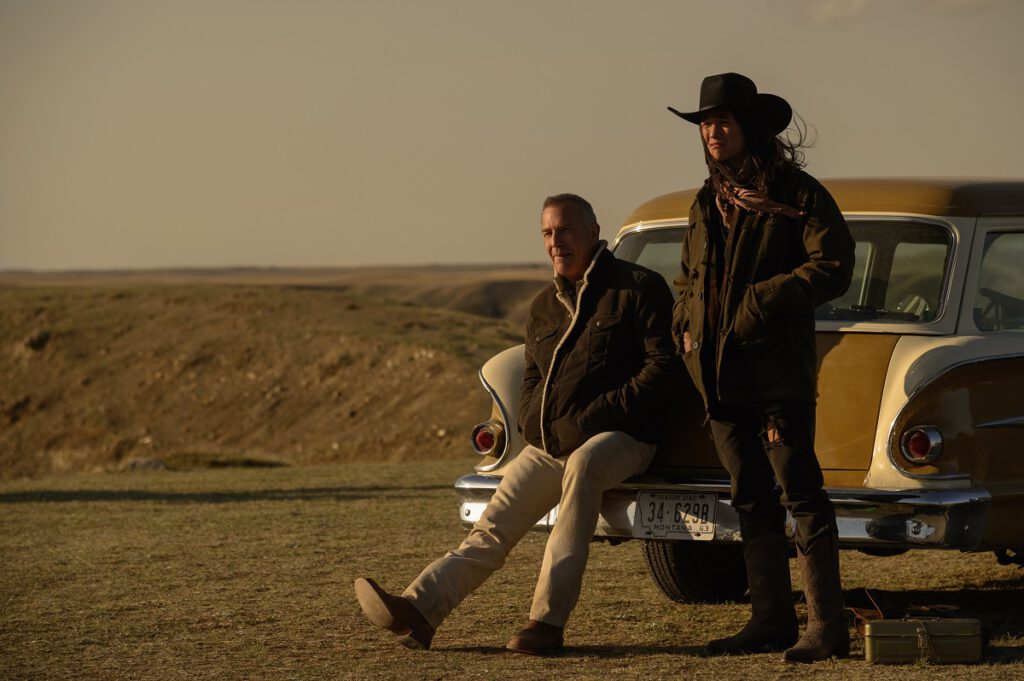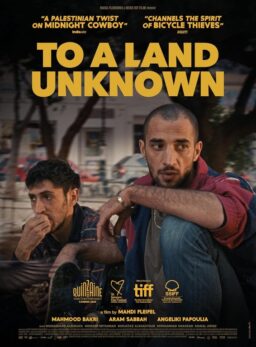Kevin Costner has worked consistently for almost four decades now, becoming one of the most popular American actors in the world. In fact, he may be the most American. After all, he’s been Eliot Ness, Wyatt Earp, and Pa Kent. He’s made some of the most beloved movies about baseball and the American West in history. And he’s really proven himself across every genre, even finding a new devoted fan base on the show “Yellowstone,” which seems to grow in popularity every year.
Costner is back in the Western genre this week, playing George Blackledge in Thomas Bezucha’s “Let Him Go,” based on the novel of the same name by Larry Watson. George is married to Margaret, played perfectly by Diane Lane, reunited with her “Man of Steel” co-star. The Blackledges suffer a tragedy when their son James dies unexpectedly, shortly after James’ wife Lorna (Kayli Carter) gives birth to a child. When Lorna remarries an abusive jerk and moves away, Margaret insists on chasing them down, trying to save her grandkid from a dark future. Lesley Manville and Jeffrey Donovan co-star in a tight, accomplished adult drama with Western undertones. Mr. Costner called us from his place in the pandemic in Montana, where he’s filming “Yellowstone,” to talk about everything from campaign finance reform to the talent of Diane Lane.
The first question in every interview now has to be are you healthy and safe?
Yeah. That’s very thoughtful. We are but we’re separated. A forced separation because of the work—I find myself in Montana. It’s a really odd thing. I’m lucky to have the economic wherewithal to be anywhere I want in the world, certainly back with my family in two hours on a plane, and I can’t do it.
How long have you been separated?
The entire show. You kind of go, “Wow.” It shows you how you can just be flattened but thank God that no I have not experienced any loss, but I’m watching loss and I am affected by it.
How has the pandemic impacted you and how do you think it will impact your industry?
It has. The conditions to work around COVID are going to cost a lot more. I’m on “Yellowstone” right now and it’s a significant part of our budget now. There’s a lot of reason to keep a hit show going and make a Marvel movie that’s going to make a lot of money. There’s not a lot of reason to do a movie like “Let Him Go” if a third of your budget has to be COVID-related to keep everyone safe. I think it’s going to affect smaller productions and unique movies because they simply can’t take that hit.
A lot of people have been commenting on the lack of mid-budget, adult-targeted films for years anyway and now they’re going to get hit even harder than they were before.
It’s absolutely true.
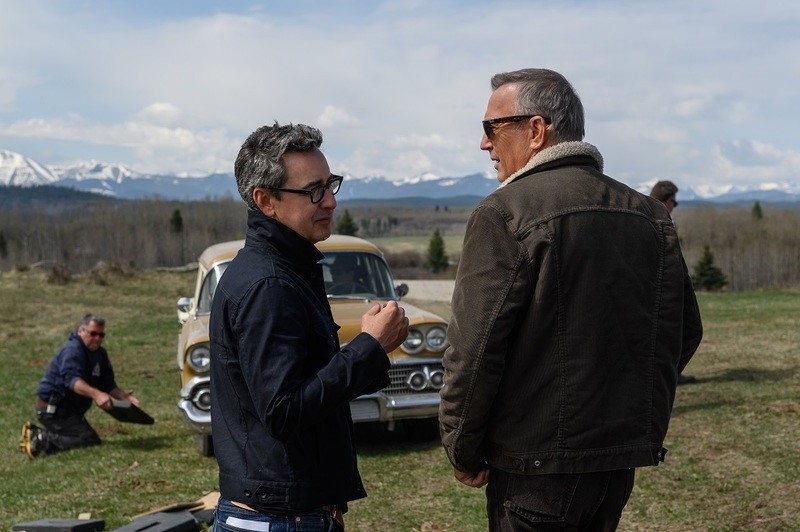
You said recently to Daily Beast that America is an idea, we have a chance to live up to it and we haven’t done it. The quote was in a political context, but I’m curious about how America can live up to what you perceive as the idea of this country on a daily, micro level in their normal lives?
I don’t know. Listen, I don’t have that platform to even suggest to people how to live. I think what happens is that there is this amazing blueprint—every four years you can make a sea change if you want. But the reality is that the sea change has to come from public service, and public service, to me, people have lost sight of it. They’ve become career oriented. Their career is more important. Their next four years is more important than the four years they’re dealing with right now. And there’s a real lack of humility and ego has found its way into politics. And money.
So what’s real? They could change that in election laws. They could take the money out of elections. They could level the playing field. There are ways to make a level playing field and take the level of influence out that money has. And it would seem to me that people that see the good of the country would start to take on these challenges one at a time. Where money can influence an election? That can’t happen. Why not make a slush fund for every time someone lies in a campaign and it can be proven later that a fine comes out of that election pot? It’s a verified lie. For us, as people, the most valuable thing that we actually collectively can have is great information and we certainly don’t get it. I think government has to change. And it shouldn’t be that big a deal because being fair in this country is not that complicated.
Sure. But people have trouble giving up power.
That’s right. How people should be what they’re gonna be—I don’t speak to that thing. They can only go forward. They don’t have a lot of tools in the box when it comes to what people are doing over the course of a term. But they do have to show up en masse when they have that chance. And pretty soon that message starts to get through.
I want to discuss how America is reflected in your work too. All of the historical movies, baseball, Wyatt Earp, Eliot Ness—you seem to have a definite interest in American history. How have you sought to reflect this country through your choices and why has that been such a big part of your career?
It’s not planned. Thank God I don’t organize my life trying to anticipate curves. Just because I like baseball doesn’t mean everyone else does. I’m not a fanatic anymore. I was when I was a kid. But I would have never done the three baseball movies had I not thought that they were different from each other. Significantly different and had their own way.
The American West—I’m drawn to that a lot because it was a time when you had to make your own choices. What I mean by that is that now when somebody injures you, people are always looking for somebody else to litigate their problems—an agent, a lawyer. Sometimes you just like to walk over and tell somebody what time it is and not feel like you’re going to be sued because they’re infringing on you or taking advantage of you. I think there’s something appealing in the West that you see people have to solve their own problems. And if you do that really well, you realize how hard and how dangerous that was. If you kill one, you’re going to have to kill them all. There’s a weird thing that happened out there, and I found it incredibly dramatic. The problem is they’ve always been kind of dumbed down. I think when you see a really good Western, it haunts you. You think that could have been me trying to protect my family, my wife.
Think about the Civil War. 600,000 died and 3 million were injured. There’s only 30 million people in the country [at the time]. And most of them after that war probably had post-traumatic stress and split. Where did they go? Out to the West where there was no law. You could be King if you were tough enough, mean enough, or whatever. There was nobody to stop you from killing the people who were here. I find it really dangerous. People like to make courtroom dramas or hospital movies—I find the drama of the West, if it’s not dumbed down, to be terrifying.
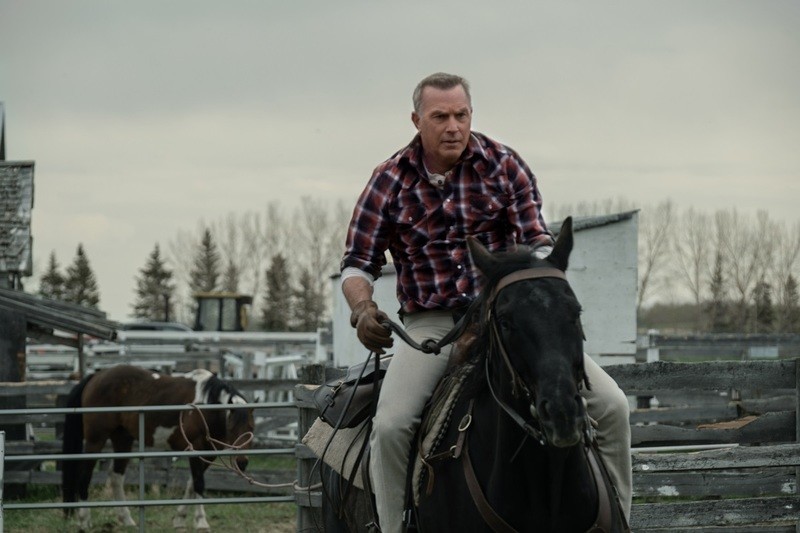
Is that fear and danger what attracted you to “Let Him Go”? It has a lot of what you just mentioned in its “What Would I Do” scenario.
I got attracted because usually movies work their way to the scary point and this movie started being scary right away. These kind of people—they do exist. There are people that are lawless and have no boundaries. These people exist and if you don’t think they do then I think you’re living in an alternate universe. What happened is I started reading and it scared me. I thought that I loved my wife so much that I would have to follow her down. And in some weird way this movie lives up to its promise. It doesn’t go well.
I was struck throughout the movie by the quiet nature of your character. He often speaks the least. The Sheriff background has him quietly assessing danger. Does it make your job harder to have to convey immediacy and urgency with body language instead of dialogue?
No, not really. I think when something’s carefully written, you can assign the right behavior to that. When you think you’re going the wrong way, you don’t talk as much anyway. She’s kind of running the show. She has a force of will and we see that in their relationship. There’s a little love story going on in the middle of all of it. And she pushes it to the limits. But our women can do that to us. They can take us to places … if there’s a slight in a bar and your wife wants to tell you about it—she puts you in an interesting spot. What happened in this movie is by nature because she’s driving it, there are so many situations where he just didn’t want to talk. He was really grinding his teeth—this isn’t good. I thought the simplicity and calmness of even having to sleep in the jail. It was honest. It was very middle of the country. I hadn’t read a movie in a long time that started with dread right off the top.
What’s it like working with Diane Lane again? Was working with her again part of the interest?
Well, yeah. What happened is you need a world-class actress to be able to take on a role like this. Listen, she’s still an incredibly beautiful woman who kind of plays this grandmother who is relentless. You can even be mad at her for being that. She took it all on. She’s really one of the great American actresses we have.
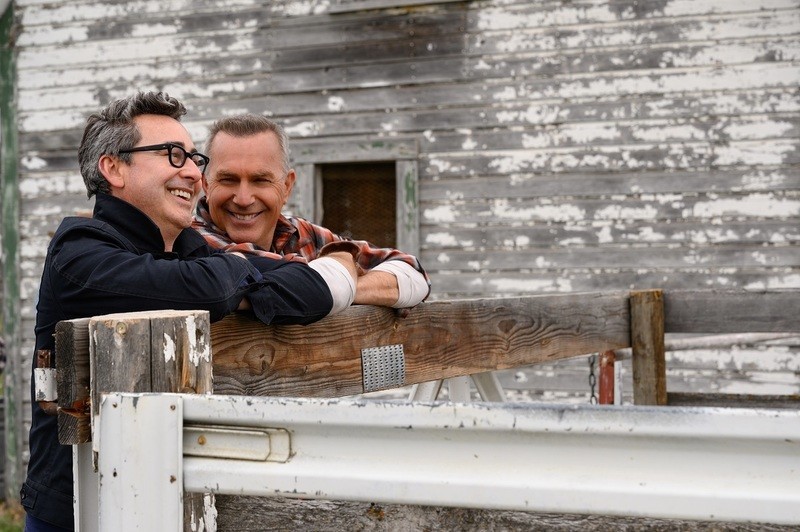
Have you been surprised at all by the fan base for “Yellowstone”? People love this show. And it’s a fan base that seems to be vocal and growing.
(Laughs.) I think while we have to be melodramatic in certain things—there’s quite a bit of murder—I think the creator has managed to create these scenes where dialogue is said you wish you were saying yourself. You are also seeing a way of life that actually is happening every day in this country. People forget that people are making a living today on a horse ranch. What’s going on here is real in terms of that life and the pressure of big landowners. He’s really made it all come together and it has that life of its own. I’ve been a part of projects that have had a life of their own. I thought they were good on the surface, but I didn’t know they were going to attract a rabid fan base or be a film that’s still watched to this day. I actually count on that. I actually want that to happen. I can’t explain it. It’s probably better that I don’t try to. I show up and I try to be as real as I can with my character and understand exactly who I am.
On the note of your old films, do you watch them? Do you have favorites—either final products or work experiences?
I don’t look back at them. Occasionally, my children will say, “Dad, is that you?!” And I’ll have to quick come and see what part they’re looking at. (Laughs.) They’re still of the age where they can’t watch a majority of them. I don’t have a tendency to look back. I worked really hard on them and I expected them to have a life if we did our job. That means everybody involved and not catering to conventional wisdoms of running time or that’s too hard to for people. I’m a big one about if you like the script then that’s what you shoot. It’s not what you edit. It’s what you shoot. It’s what the people see. That’s what I really believe.
Is that the main thing that draws you now—the script?
Nothing has changed about me that much at all. I have not changed. I’ve always wanted them to have an afterlife beyond their opening weekend—I feel that that only comes from something that’s relevant and stands up. I’ve never made a choice about money. I’ve never made a choice about just being busy. I don’t really orchestrate that way.
What role do collaborators play when you’re picking a part—if a major director is on a project for example?
I haven’t really orchestrated my career around that—around the big, successful directors. I’m willing to go work there but if a writer comes up and writes a nice screenplay and wants to direct it then I’ll go do that. I haven’t tried to be bulletproof by being that protective.

